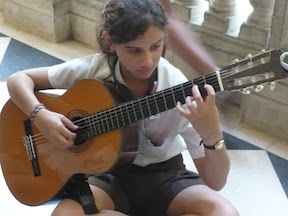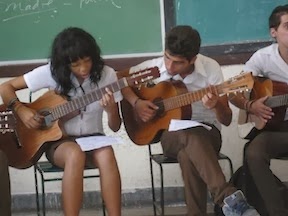The first time I attended the Festival Leo Brouwer (2011)
many things struck me as unusual.
Some of them I now take for granted: that audiences will be diverse in
terms of age, race, and socioeconomic status; that the musicians themselves
will be younger and much less male and white than their counterparts in the
US. Other things which struck me
then still have resonance - one of the chief of these has to do with musical
education in Cuba. The Havana
Chamber Orchestra is a young group; the oldest player is mid-30s. I did the arithmetic and found that
these young musicians were just entering school at the start of the Special
Period - that period when Cuba lost its trading partners with the end of the
Soviet bloque and when the US blockade was tightened to try to force Cuba to
capitulate. The early 90s were
terrible in Cuba - without adequate fuel, transportation, electricity,
inadequate food, and much very genuine suffering which was spread out fairly
equitably so that no one actually starved to death and all adults lost weight.
(I have heard everywhere that adults went to bed hungry so that the kids could
eat.) In the midst of this, some
talented children were recognized, their talents nurtured and brought to the
point of glorious professionalism that we hear now.
What kind of society is it that, in the midst of a severe economic crisis, finds the
will and resources to care for art music and its transmission through the
generations? Clearly one which
actually believes that to be educated and cultured is to be free - a Jose Marti
saying one sees here often.
Clearly one that values its artists as essential, not decorative, and
not superfluous in times of crisis.
I contrast this to the US where in the majority of school districts free
public arts education is either going or already gone. I wish we had our priorities as
straight.
I have visited the top level conservatory in Havana (the
Instituto Superior de Arte) and if you set aside "little things" like
gender and race, they are much like upper level US conservatories. This year I had the chance to visit one
of the many secondary school level conservatories - the Amadeo Roldan - and it
was an unusual experience. The
guitar class I visited was having its first rehearsal of a work in 4 parts, the
Leo Brouwer Toccata. There were 18 students and a teacher, the young guitarist
Joe Ott Pons, just starting an international performance career. The chairs were in bad condition, there
weren't enough music stands so they pulled up tables in front of rows of students
to hold the sheet music, the walls are not at all sound-resistant so loud
invading brass and other noise is heard.
The students use strings until they break - a very generous donation by
Strings By Mail allowed each student to have a new set after this visit. Then - and this often happens in every
country - there were serious errors in the sheet music that had to be corrected
for 4 different parts. The noise
level was enormous and I was thinking that this was not fun and that I didn't
see how any serious work could get done in this atmosphere. Finally they were ready - first
rehearsal, remember, and with many corrected bits that they would have to
sight-read. I expected nothing but
in fact they produced an astonishingly good first run-through. They seemed unaffected by the noise and
chaos which were so distressing me; they had fierce concentration on the music
and seemed undistractable. Furthermore, the professor, far from being
distressed by the adverse conditions not only was able to concentrate but spoke
afterward of how much he enjoyed teaching. It did make me think that we US guitarists are rather
sensitive and hot-house by comparison.
Prof. Ott said that after learning guitar in this system he is
completely unbothered in concert by noise and movement and I have no trouble
believing this.
So - the differences are: it's free, it's public and
available to any child with interest and ability. Guitar students learn from the beginning to work in guitar
orchestras and other instrument ensembles, to sight-read and to follow a
conductor, just like other music students. The physical conditions are those of a poor country -
crowded, noisy, broken, used up - but the vitality and enthusiasm and ability are
enormous. The gender and race
distribution is more equitable. Of
18 students 10 were boys and 8 girls.
I didn't try to count by race because race in Cuba is a spectrum rather
than a division and it is not always clear to me who is what. Prof. Ott was rather shocked when I
told him that guitar instruction in the US for students ages 13-16 is generally
only available to those whose parents can pay for private lessons. What is a luxury and what is a
necessity? Here music is
necessary. In fact Leo Brouwer himself said that if we remained without music
for 48 consecutive hours, he believes there would be a world-wide
catastrophe. I believe this too.
Si nos quedáramos sin música cuarenta y ocho horas,
absolutamente cuarenta y ocho horas seguidas, creo que podría haber una
catástrofe mundial.
 |
| "Of course I've learned my part, Profe." |
 |
Practicing in the hall
(Students get their secondary school uniforms when they first start
school, then proceed to grow out of them. Fortunately the girls
wear skorts, not skirts, because they
get quite high and tight.) |
 |
| Music stands are in short supply. |
 |
There's no room and no footstools.
Students change guitar position as they advance. |
 |
| The pleasure of getting it right. |
 |
| Somehow it all works out. |
 |
| Trying to hear in a noisy environment |
 |
| Each of 4 parts had to be corrected. "How much would the right notes cost?" |
 |
| Thanks, Strings By Mail. You're great! |

 |
| Private lesson |
 |
| The professor is Joe Ott Pons |
 |
The student is Lazaro E Garcia Roman, age 15.
|
 |
| Thank you, Strings by Mail, for your generous donation. |
 |
| A broken string made the Strings by Mail donation very timely for this student. |
























